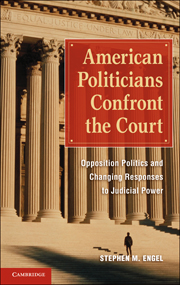 American Politicians Confront the Court
American Politicians Confront the Court Book contents
- Frontmatter
- Contents
- Acknowledgments
- Introduction
- PART I POLITICAL DEVELOPMENT AND ELECTED-BRANCH RELATIONS WITH THE JUDICIARY
- PART II HOSTILITY TO JUDICIAL AUTHORITY AND THE POLITICAL IDIOM OF CIVIC REPUBLICANISM
- 3 In Support of Unified Governance
- 4 Party against Partisanship
- 5 “As Party Exigencies Require”
- PART III HARNESSING JUDICIAL POWER AND THE POLITICAL IDIOM OF LIBERAL PLURALISM
- On the Return of Opposition Illegitimacy and the Prospects for New Development
- Index
- References
3 - In Support of Unified Governance
Undermining the Court in an Anti-Party Age
Published online by Cambridge University Press: 05 June 2012
- Frontmatter
- Contents
- Acknowledgments
- Introduction
- PART I POLITICAL DEVELOPMENT AND ELECTED-BRANCH RELATIONS WITH THE JUDICIARY
- PART II HOSTILITY TO JUDICIAL AUTHORITY AND THE POLITICAL IDIOM OF CIVIC REPUBLICANISM
- 3 In Support of Unified Governance
- 4 Party against Partisanship
- 5 “As Party Exigencies Require”
- PART III HARNESSING JUDICIAL POWER AND THE POLITICAL IDIOM OF LIBERAL PLURALISM
- On the Return of Opposition Illegitimacy and the Prospects for New Development
- Index
- References
Summary
The Jeffersonian assault on judicial authority was grounded in civic republican ideas that did not grant the validity of dissenting views on constitutional meaning and thus did not acknowledge the legitimacy of opposition. Additional telltale characteristics of the republican idiom were made manifest during these years including rhetoric of a substantive and identifiable common good and conflation of political opposition with anti-constitutional conspiracy. Notwithstanding images of separate institutional powers checked and balanced against one another, the Founding generation expected the federal judiciary to be part of a unified governing regime, which served an identified common good and which was guided by a Constitution of fixed and discoverable meaning. If anything, Jeffersonians (or Republicans as they came to identify themselves) were more insistent on this point than Federalists. They could not conceive of a legitimate federal government in which the different branches would act on competing principles since they considered those principles to be “immutably fixed” by a written Constitution approved by the people themselves. As such, many Jeffersonians considered the practice of constitutional interpretation to be illegitimate and to signal a move away from the Framers' limited intentions for national power; as one member of Congress put it during early debates on establishing a national bank, “We have already gone much too far in explaining the constitution; and if we continue on the same plan, there is a danger that we shall at length persuade ourselves, that every power which is not expressly refused is given to us.”
- Type
- Chapter
- Information
- American Politicians Confront the CourtOpposition Politics and Changing Responses to Judicial Power, pp. 71 - 130Publisher: Cambridge University PressPrint publication year: 2011
